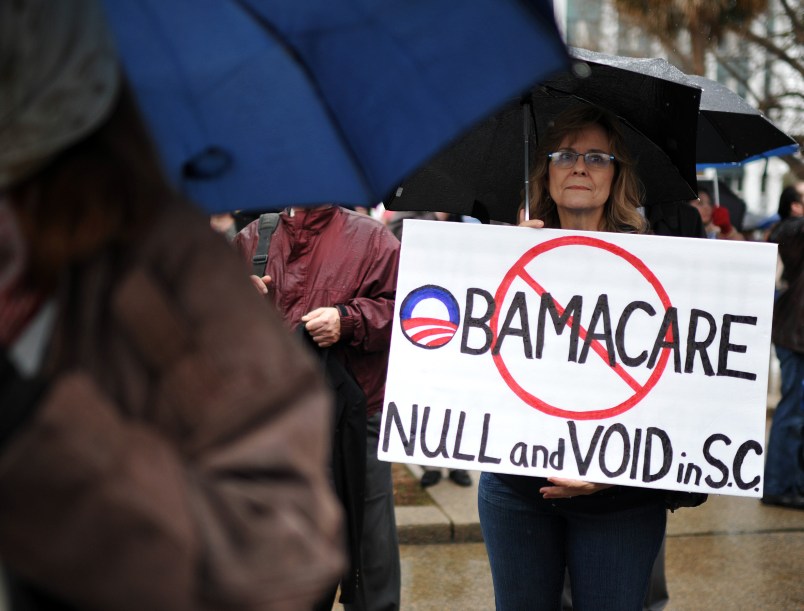MIAMI (AP) — Florida’s Republican leaders have fought the Affordable Care Act at every turn, banning navigators from county health departments, offering no state dollars to boost outreach efforts to 3.5 million uninsured and leading the fight to repeal the law. Yet the state has emerged as a tale of what went right with President Barack Obama’s health care overhaul.
More than 440,000 Florida residents had been enrolled through the federal marketplace through the end of February, putting Florida on pace to exceed the federal government’s initial projections by the time enrollment closes March 31.
The numbers are impressive for a state where Republicans control the governor’s mansion and both houses of the Legislature. By comparison, Republican-leaning Texas has enrolled 295,000 through the federal site, even though its population is about a third larger than Florida’s.
Florida’s success is due partly to infrastructure created in the swing state by Democratic-affiliated groups during the last three presidential elections, along with continued investment by the Obama administration and nonprofit advocacy groups in the diverse state that will likely be competitive in November’s midterm election.
Groups helping customers enroll in ACA-related health plans have used many of the same people who ran Obama’s presidential campaigns, giving them five years of deeply-entrenched relationships in communities, data to pinpoint the uninsured and veteran volunteers to track them down. The state narrowly went for Obama in 2012.
The successes and failures of the Affordable Care Act also carry more political weight in a battleground state such as Florida where the new law will fuel election campaigns for both Republicans and Democrats, said Democratic strategist Screven Watson.
“(The Republicans) are going to use Obamacare as a hammer over the Democratic candidates in November,” he said, adding that if Florida’s enrollment numbers were dismal, it could have big implications in 2016.
“When you’re talking presidential elections, if you have Florida you win,” he said.
Florida’s Republican leaders chose not to spend any state money marketing the new health plans to millions of uninsured, so the work was supported by $20.5 million in federal grants plus manpower from the nonprofit organization Enroll America.
Florida residents have also been reached by federally funded TV, radio and digital ads. About $52 million has been spent in the last three month on the ads in Florida and the other 28 states relying on the federal marketplace, said Julie Bataille, spokeswoman for the Centers for Medicare and Medicaid Services. The agency has repeatedly declined to provide a state-by-state breakdown of how taxpayer dollars are being spent on ads.
Enroll America’s Tony Penna began in 2008 as a volunteer neighborhood team leader for Obama’s campaign in Jacksonville, manning three phone banks a night. By 2012, he was a paid organizer for the campaign, overseeing neighborhood leaders and volunteers as they canvassed apartment buildings, staffed tables at community events and made nightly cold calls.
Penna is using those same strategies in his role now as field director for Enroll America overseeing Jacksonville, Tallahassee and Gainesville.
“It helped me build those relationships with volunteers and keep them constantly motivated,” said Penna, who estimates about half the volunteers have campaign experience. “It’s a longer-term goal because it’s a longer term process … they want to know what the effect of their work really is.”
Elsewhere, enrollment results have been mixed in other states that were closely contested in the 2012 presidential election and now rely on the federal exchange. North Carolina has already beaten the initial federal projections for enrollment by the end of March, while Virginia and Wisconsin appear on track to meet the projection. Ohio is falling short of projections.
Enroll America is active in 11 states including Texas, Arizona and Georgia. But the group has claimed a stronghold in Florida, with 40 staff and nearly 5,000 volunteers compared to 38 staff and about 3,000 volunteers in Texas.
Florida’s largest navigator grant, $4.2 million, went to the University of South Florida, which hired about 100 navigators, many of whom have years of experience enrolling people in Medicaid and a program that provides health insurance to children from low-income families.
“They have the relationships. They’re already trusted as credible sources of information about health coverage,” said Jodi Ray, who oversees the USF program. “That makes a big difference.”
Instead of creating new programs, USF expanded their staff to help with marketplace enrollment, relying on 10 subcontractors, all with a track record of doing health care outreach, including Florida CHAIN, one of the state’s largest health advocacy groups.
“This required constant evaluation of whether the strategies were effective and successful and adjustments were made in order to fully maximize resources and improve efficiency,” said Leah Barber-Heinz, executive director of Florida CHAIN.
While Texas leaders say they struggled to navigate bureaucratic red tape to move funds or make quick, critical decisions to tailor outreach efforts, Florida’s main contractors knew they needed to be flexible if they were going to meet the high demand and target it to various demographics.
If that meant finding a way to hire new navigators instead of having the same people travelling long distances for enrollment events, then USF found a way to make it work.
Coalitions in other states are often local or regional, said Anne Filipic, president of Enroll America.
“In Florida, it’s statewide and they’ve been doing it for years,” she added.
___
Associated Press writer Ramit Plushnick-Masti in Houston contributed to this report.
___
Kennedy can be followed on Twitter https://twitter.com/kkennedyAP
Copyright 2014 The Associated Press. All rights reserved. This material may not be published, broadcast, rewritten or redistributed.






